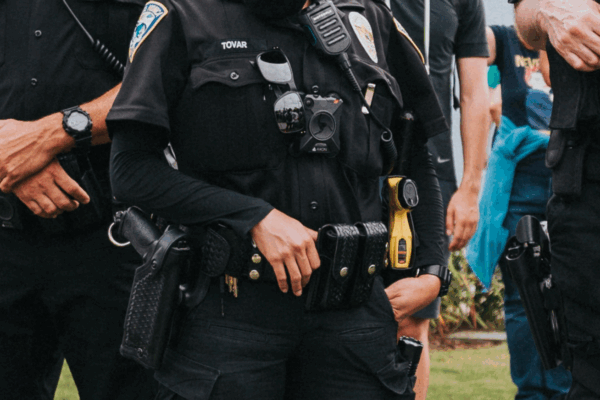By Rita Bettis Austen, ACLU of Iowa Legal Director
Body cameras have the potential to provide desperately needed public oversight of police in order to curb police abuses, but their use must be accompanied by strong, clear policies to govern their use, data retention, and sharing.
The ACLU of Iowa sees body cameras as potentially positive because they can foster government oversight and police accountability to the community. They have the potential to reduce incidents of use of force if the public can access records and make sure that these devices truly deliver on the promise of heightened public oversight of police.
Meanwhile, the law that currently governs the release of law enforcement body camera footage, the Iowa Open Records law, is outdated and has been subject to widespread misinterpretation by law enforcement, who frequently deny access to body camera footage. Iowa's Open Record law must be revised so that government officials can no longer refuse to share what should be public documents and so that law enforcement must release body camera footage for public review in certain cases.
It's also important to note that in order to be an effective oversight tool, adoption of body cameras must be accompanied by strong, clear policies to govern their use, data retention, and sharing.
Thoughtful legislation is needed to balance accountability, transparency, and privacy.
When to Turn Off and On
A key element in body camera use is when they are—or are not—turned on. While body cameras can provide unique insight into a contested police encounter, we should guard against their use as a surveillance tool.
There's also the privacy of the police officers to consider. For example, a police officer should be allowed to turn his or her body camera off for bathroom breaks and personal conversations.
However, body cameras should be required to record all encounters between uniformed police officers and the public. The cameras should be required to run for the full duration of the encounter. An officer shouldn’t be able to turn it off on a case-by-case basis to shield his or her behavior from review.
Data Retention
Collected images from government surveillance cameras should always be guided by policies limiting how the footage is stored and shared. Video from body cameras also must be governed by similar policies.
Videos for which the public oversight value is high should be flagged and retained. Policies should automatically flag for retention all videos of incidents involving any use of force, arrest, or detention, or when either a formal or informal complaint is made. In addition, people who are recorded by police body cameras should be able to access and copy footage, as well as flag it for retention. At the same time, those videos with no ascertainable oversight value should be deleted as soon as possible.
Public Access
Police body cameras catch sensitive footage of people in physical and emotional crises, domestic and sexual assault victims, children and teenagers, and people in other vulnerable circumstances. The footage could be used to discover all sorts of sensitive information, like who attends a particular church, or even to see people entering a medical clinic. While the public should have access to certain flagged videos where government oversight value is high, it’s clear that sensible privacy protections should also be adopted.
Legislation that balances the competing issues of privacy, police accountability, and government transparency is required. Currently, most law enforcement agencies apply Iowa’s existing definitions of confidential records too broadly in order to withhold release of body camera footage, weakening overall government transparency.
In addition, people who are the subject of recordings must be able to access and copy the recordings. Public disclosure should be allowed with the consent of the recorded subject, and defense attorneys should be provided all footage relevant to their client’s case. However, footage that has not been flagged should not be publicly disclosed without the subject’s consent.
Internal Controls
Finally, the computer systems used to store and access body camera data should limit and automatically document which officers access, share, and delete video. Otherwise, departments and the public run the risk that those videos that are most useful to understanding conflict between officers and the public, especially when force is used, are not available when they are most needed. If an officer knows video footage depicts evidence of wrongdoing or abuse, he may have a strong incentive to destroy the footage.
Police body cameras can be a win-win, but only if they are deployed within a framework of strong policies to guide their use. The ACLU of Iowa is committed to working with law enforcement and legislators on policies that provide maximum oversight while still protecting privacy.



